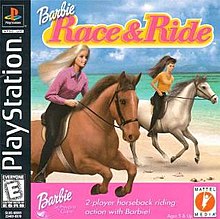Gameplay
Players can decide whether to play in 1-player mode or 2-player mode (in 2-player mode, they will not be able to clean and care for their horse). A player will choose one of two outfits for their character and then they'll pick their horse. [7]
Before players can go out on one of the trails, they must go through a riding lesson. Once that's taken care of, they can go to four areas: Beach, Forest, Meadow and Mountain; of which, only the Beach and the Meadow will let them race against other players. There is also a "Secret Ranch," where players find a foal and win the game. [7]
There are only four horses players can choose from all of which are identical apart from in every way except colour. The player then can pick a name from a predetermined list, such as Buttercup, Sweetie. [1]
Reception
The game received generally negative reviews. Carrie Shepherd writing for Daily Radar gave the game a "DUD" rating, the lowest of the 4 ratings available on the site. She said it was hard to imagine how the game could be worse and criticised it for lack of challenge and fun. [1] A review in the French gaming magazine Consoles + [ fr ] gave the game a mere 6% calling it ugly, crude, devoid of interest and an insult to all girls. [8] John Cooper for Game Tour added that the level design was terrible and the abundant mini games were laughably simple. [3]
Janet Valentine reviewing the game for GameSpot UK , on the other hand, was the more positive about the game, giving it a 7.9/10. Valentine says that for its target audience "it delivers the goods in captivating quantity" and complimented it as "one of very few specifically for young girls on the PlayStation". [7]
This page is based on this
Wikipedia article Text is available under the
CC BY-SA 4.0 license; additional terms may apply.
Images, videos and audio are available under their respective licenses.
